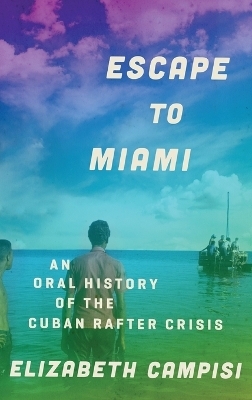
Escape to Miami
An Oral History of the Cuban Rafter Crisis
Seiten
2016
Oxford University Press Inc (Verlag)
978-0-19-994687-7 (ISBN)
Oxford University Press Inc (Verlag)
978-0-19-994687-7 (ISBN)
The Naval base in Guantánamo Bay, Cuba has been in the news constantly since the U.S. began using it as a prison camp after the terrorist attacks of September 11, 2001. With all the controversy surrounding the torture of suspects at the prison, its precedent-setting prior use as an immigrant detention center for Haitian and Cuban boat people has been largely overlooked. Overcoming Guantánamo is an oral history of the rafter crisis and the camps written by an anthropologist who worked in the camps.
More than a straight oral history, the book is a study of group-level trauma and coping. Using a trauma studies perspective along with discourse-oriented models from anthropology, the book discusses examples of the extensive camp artwork as well as the oral history narratives as part of a meaning-making process that necessarily occurs as people recover from trauma. Campisi worked in the Cuban camps for a year as a temporary employee of the Justice Department's mediation service, and then returned to analyze the camps from an anthropological point of view. She conducted life history interviews of twelve of the rafters, which included the process of disenchantment with the Revolution, leaving Cuba, the rafting trip, life on the base, and their initial experiences in Cuban Miami, focusing on life on the base. Their stories are gripping. Some people provided disturbing accounts of military abuses, which is an ancillary reason that Overcoming Guantánamo is important right now: human rights violations that occurred at the prison for terror suspects also occurred in the Cuban and Haitian camps, but few people know about them. All such violations should be taken into account in current debates about the use of the base.
While it is important as an oral history, the book's examination of the camp culture also makes it a new contribution to the field of anthropology. Campisi argues that because trauma has cognitive and emotional impacts that require an individual to create new meanings, when people work through individually-traumatic experiences as a group, the new meanings they generate together create new cultural forms. Hence, social trauma can be culturally generative. In these times, that is an important conclusion.
More than a straight oral history, the book is a study of group-level trauma and coping. Using a trauma studies perspective along with discourse-oriented models from anthropology, the book discusses examples of the extensive camp artwork as well as the oral history narratives as part of a meaning-making process that necessarily occurs as people recover from trauma. Campisi worked in the Cuban camps for a year as a temporary employee of the Justice Department's mediation service, and then returned to analyze the camps from an anthropological point of view. She conducted life history interviews of twelve of the rafters, which included the process of disenchantment with the Revolution, leaving Cuba, the rafting trip, life on the base, and their initial experiences in Cuban Miami, focusing on life on the base. Their stories are gripping. Some people provided disturbing accounts of military abuses, which is an ancillary reason that Overcoming Guantánamo is important right now: human rights violations that occurred at the prison for terror suspects also occurred in the Cuban and Haitian camps, but few people know about them. All such violations should be taken into account in current debates about the use of the base.
While it is important as an oral history, the book's examination of the camp culture also makes it a new contribution to the field of anthropology. Campisi argues that because trauma has cognitive and emotional impacts that require an individual to create new meanings, when people work through individually-traumatic experiences as a group, the new meanings they generate together create new cultural forms. Hence, social trauma can be culturally generative. In these times, that is an important conclusion.
Elizabeth Campisi is Special Projects Director, Center for the Elimination of Minority Health Disparities, University at Albany, SUNY
Preface ; Introduction ; Chapter 1: Historical Context of the Rafter Crisis ; Chapter 2: On Becoming a Balsero: Disenchantment, Disaffection and Escape. ; Chapter 3: Improvisations: Trauma and Coping in the Camps ; Chapter 4: My Introduction to Gitmo ; Chapter 5: My Experiences in the Camps ; Chapter 6: Crisis, Creativity, and the Flavor of Freedom ; Chapter 7. Epilogue: A Different Kind of Rafter Crisis: PTSD and the U.S. Cuban Community ; Conclusion ; Appendix ; Bilbliography
| Erscheint lt. Verlag | 30.6.2016 |
|---|---|
| Reihe/Serie | Oxford Oral History Series |
| Verlagsort | New York |
| Sprache | englisch |
| Maße | 241 x 155 mm |
| Gewicht | 499 g |
| Themenwelt | Geschichte ► Allgemeine Geschichte ► Zeitgeschichte |
| Geisteswissenschaften ► Geschichte ► Regional- / Ländergeschichte | |
| Sozialwissenschaften ► Soziologie | |
| ISBN-10 | 0-19-994687-6 / 0199946876 |
| ISBN-13 | 978-0-19-994687-7 / 9780199946877 |
| Zustand | Neuware |
| Haben Sie eine Frage zum Produkt? |
Mehr entdecken
aus dem Bereich
aus dem Bereich
wie Freud im Kollektiv verschwand
Buch | Hardcover (2024)
Klett-Cotta (Verlag)
25,00 €


